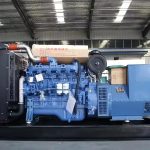Ensuring Fuel Quality Standards for Diesel Generators

Introduction
Diesel generators play a crucial role in providing backup power during emergencies or in areas where grid power is unreliable. These generators are powered by diesel fuel, making fuel quality a critical factor in ensuring the reliable operation and longevity of diesel generators. In this article, we will explore the importance of fuel quality standards for diesel generators, the impact of poor fuel quality on generator performance, and the measures that can be taken to maintain fuel quality to maximize the efficiency and lifespan of diesel generators.
Importance of Fuel Quality Standards for Diesel Generators
Fuel quality standards are essential for diesel generators to ensure optimal performance, efficiency, and reliability. The quality of fuel used in diesel generators directly impacts the combustion process, engine performance, emissions, and overall maintenance requirements. Poor fuel quality can lead to a range of issues such as reduced power output, increased fuel consumption, engine deposits, corrosion, and increased emissions.
Fuel quality standards define the specifications that fuel must meet to ensure it is suitable for use in diesel generators. These standards typically cover parameters such as cetane number, sulfur content, lubricity, viscosity, water content, and stability. Adhering to fuel quality standards helps prevent potential problems and ensures the smooth operation of diesel generators.
Impact of Poor Fuel Quality on Generator Performance
The use of poor-quality fuel in diesel generators can have a significant impact on performance and efficiency. One of the most common issues resulting from poor fuel quality is injector fouling. Impurities and contaminants in the fuel can accumulate on the injector nozzles, leading to poor fuel atomization, incomplete combustion, and reduced engine efficiency.
Additionally, poor-quality fuel can result in the formation of engine deposits, which can cause a range of problems such as sticking valves, clogged filters, and reduced engine power. Corrosion is another issue that can arise from low-quality fuel, leading to fuel system damage and leaks.

1000kw diesel generator for remote humanitarian projects can also affect the overall reliability and lifespan of diesel generators. Poor fuel quality can increase wear and tear on engine components, leading to premature failure and costly repairs. Furthermore, the use of low-quality fuel can result in increased emissions, contributing to environmental pollution and regulatory compliance issues.
Measures to Maintain Fuel Quality for Diesel Generators
To ensure the optimal performance and longevity of diesel generators, it is essential to take proactive measures to maintain fuel quality. The following are some key steps that can be taken to preserve fuel quality for diesel generators:
1. Fuel Quality Testing: Regular testing of fuel samples is essential to assess the quality of the fuel and identify any potential issues. Testing should cover parameters such as water content, sulfur content, cetane number, and viscosity. By monitoring fuel quality through testing, any deviations from standard specifications can be detected early, allowing corrective actions to be taken.
2. Fuel Filtration: Installing high-quality fuel filtration systems is crucial to remove impurities and contaminants from the fuel before it reaches the engine. Effective filtration can help prevent injector fouling, engine deposits, and corrosion, enhancing the performance and reliability of diesel generators.
3. Fuel Storage: Proper storage of fuel is essential to maintain its quality over time. Fuel should be stored in clean, dry, and well-ventilated tanks to prevent contamination and degradation. Regular inspections of fuel storage tanks should be conducted to ensure compliance with safety and environmental regulations.
4. Fuel Additives: The use of fuel additives can help improve fuel quality and enhance the performance of diesel generators. Additives such as lubricity enhancers, stabilizers, and biocides can be used to address specific fuel quality issues and maintain the cleanliness and stability of the fuel.
5. Fuel Management: Implementing a comprehensive fuel management program is essential to ensure the consistent supply of high-quality fuel to diesel generators. This includes proper fuel procurement, storage, handling, and dispensing practices to minimize the risk of fuel contamination and degradation.
Conclusion
Fuel quality standards are paramount for ensuring the reliable operation and longevity of diesel generators. Poor fuel quality can lead to a range of performance issues and maintenance problems that can compromise the efficiency and lifespan of diesel generators. By adhering to fuel quality standards and implementing proactive measures to maintain fuel quality, operators can optimize the performance, efficiency, and reliability of diesel generators, ultimately reducing operational costs and ensuring uninterrupted power supply during emergencies.
